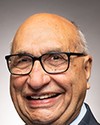I don't think they have, and I think the more any government can focus on firearms offences, or firearms-related offences, as well as domestic and intimate partner violence, the more Canadians will feel safe. The more focus you put on that, the more provinces and the more Crown attorneys and judges will pay attention, and we will get to a world where it is not okay to do any of those things.
Evidence of meeting #4 for Justice and Human Rights in the 45th Parliament, 1st session. (The original version is on Parliament’s site, as are the minutes.) The winning word was officers.
A recording is available from Parliament.




